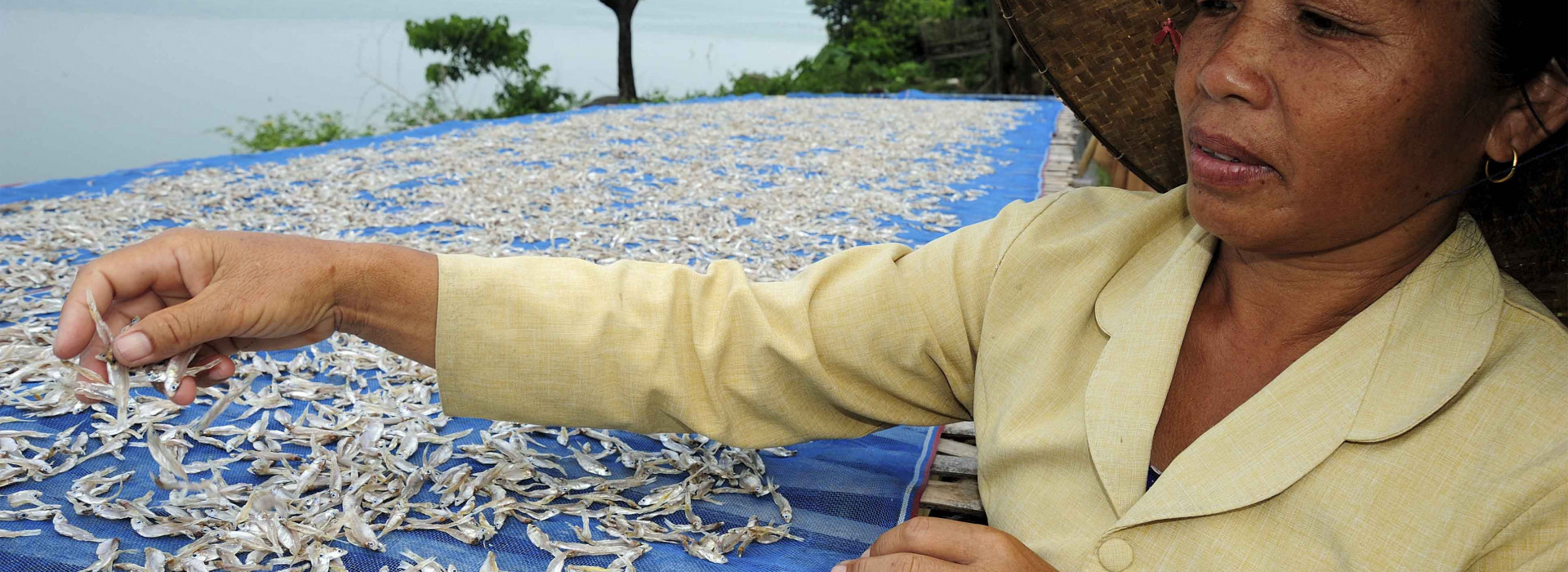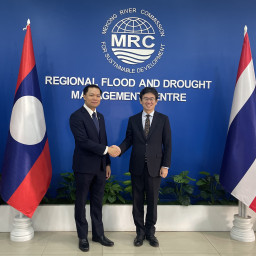Press Release: Mekong River Commission Mainstreams Gender in its Work with a New Action Plan
12 October 2017, Vientiane – Today, the MRC Gender Action Plan Consultation and Capacity Building Workshop for Mainstreaming Gender in the Organization brings together member countries of the Mekong River Commission (MRC), experts of the MRC Secretariat (MRCS), and other partners to discuss the MRC Gender Action Plan developed by the MRC Secretariat. The workshop further provides an opportunity for the National Mekong Committee Secretariats to develop and strengthen their own Action Plans to align with the MRC Gender Action Plan.
The two-day workshop will be an enriching experience where participants will hear from the experts and exchange views from one another as to why gender mainstreaming is fundamental to natural and water resource development and management.
“The MRC uptakes ‘gender’ as a critical ingredient in achieving an economically prosperous, socially just and environmentally sound Mekong River Basin” said Officer in Charge of the MRC Secretariat Dr Tien Truong Hong. “We recognise men and women play different roles in development and have different needs, interests, and access to water and natural resources.”
The MRC’scommitment in Gender mainstreaming dates to a decade back, guided by the MRC Gender Strategy and Policy that was endorsed in 1998 and 2000 respectively. Recognising ‘gender’ as a national priority to increase equitable economic and social development outcomes, riparian countries have also developed their national gender strategies and plans.
The MRC Gender Action Plan builds on these policy and strategy to ensure gender dimension is mainstreamed in both technical and institutional levels. These means strengthening technical capacity and accountability system for gender mainstreaming in MRC technical work; promoting gender sensitive organizational culture and working environment while also generating commitment of the leadership. Examples of gender integration in key MRC activities include sex-disaggregated data collection, monitoring, development of guidelines and strategies that address different impacts to men and women as needed.
Facilitated by technical experts from the Women Organizing for Change in Agriculture and Natural Resource Management (WOCAN), participants will be introduced with an organizational assessment tools to identify key opportunities and gaps for gender mainstreaming in their respective organizations. These assessments and the MRC Gender Action Plan will guide participants to develop and improve the National Mekong Committee Secretariat’s Action Plans.
“As a development partner to the Mekong River Commission and a supporter of sustainable development in the region, Sweden strongly believes that gender equality is key in all areas of work” said Daniel Klasander, Deputy Head of Sweden’s Regional Development Cooperation in Asia and the Pacific. “The environment, the people and the river basin itself will benefit from more focus on gender equality in the countries’ cooperation and river management. This regional gender workshop will contribute with important learning, sharing of experiences and lay the ground for more action going forward.”
Organised with partial support of GIZ and Sweden’s International Development Cooperation, the workshop will identify next steps and a monitoring framework for the MRC to ensure timely support and effective implementation of its gender action plan.
Read news in: | Khmer | Lao | Thai | Vietnamese |
Related information:
MRC Gender Policy and Strategy: http://www.mrcmekong.org/assets/Publications/policies/MRC-Gender-SP-05-Jan-2013-Eng.pdf
Case Study - Gender training transforms lives of men and women in Lao fishing village*
As part of a fisheries management project for Nam Ngum communities in Lao PDR and another project in 2007 with the Living Aquatic Research Centre, the former MRC Fisheries Programme provided training on gender awareness and sensitivity. In addition, they provided technical training on fish preserving and processing.
Family incomes have since risen to about two dollars a day and the division of labour has changed. Men help women do the housework including fish processing and taking care of the children. The women now have more time to work on fish processing, storing fish and keeping it fresh. Living conditions have also improved as women have been trained to pay more attention to hygiene and sanitation.
*Excerpt from Case Study, Catch & Culture, April 2015
-END-
Note to Editors
The Mekong River Commission (MRC) is the intergovernmental organization established to promote cooperation on the sustainable management of the Mekong Basin whose members include Cambodia, Lao PDR, Thailand and Viet Nam. The MRC acts as a platform for water diplomacy and regional cooperation in which member countries share the benefits of common water resources despite different national interests, and address transboundary pressures in the basin. It also serves as a knowledge hub that promotes regional cooperation and policy-making based on scientific evidence. The commission looks across all sectors including sustaining fisheries, identifying opportunities for agriculture, maintaining the freedom of navigation, flood management and preserving important ecosystems. Superimposed on these are the future effects of more extreme floods, prolonged drought and sea level rise associated with climate change.
Sweden’s international development cooperation: The objective of Sweden’s international development cooperation is to create opportunities for better living conditions for people living in poverty and oppression.
Women Organizing for Change in Agriculture and Natural Resource Management (WOCAN) is a women-led international membership network of women and men professionals and women's associations. The Theory of Change of WOCAN describes our understanding that progress in women’s empowerment and gender equality requires changes at two levels: Individual women and women’s groups at the community level that experience a change in their conditions and positions; Organizations that can have an influence and support women’s empowerment and gender equality through their policies, financial allocations and plans (creating enabling environments).
-END






